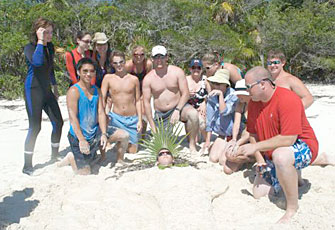Student Focus
Budding pharmacists take to new elective like
fish to water

Students and faculty take a break
from laboratory and fieldwork to clown around on a white-sand beach in
the Bahamas.
edicine from the sea took on new
meaning for Doctor of Pharmacy student Katerina Pappas of Tupelo, after
spending two weeks this summer exploring coral reefs in the
Bahamas.
Pappas was among some 20 UM students participating
in a field course in a protected marine reserve off Lee Stocking
Island, part of the Greater Exuma chain of the Bahama Islands. The
study’s aim was to motivate a new generation to explore the continued
survival of coral reefs.
“As a pharmacy student, learning how ‘drugs
from the sea’ are discovered was really interesting, and I don’t think
it would have made such an impact on my learning if it had occurred in
a classroom setting,” Pappas said. “It also helped me really understand
that everything is interconnected – environmental preservation,
ecology, pharmacognosy, medicine – and getting the full picture is
essential.”
The field course is just one of more than a dozen
new electives pharmacy students can take to meet their degree
requirements, said Marvin C. Wilson, associate dean of academic and
student affairs.
“The new electives grew out of changes in our
accreditation standards in 2007, and students must complete five hours
of them during the first two years of their professional program,”
Wilson said. “We asked each department to develop at least two
electives. The one in the Bahamas was created by the pharmacognosy
department, and it appears to be a big hit.”
One of the most diverse, richest ecosystems on the
planet, coral reefs are threatened by pollution, climate change and
human activities. The risks of coral reef extinction are so real that
marine biologists worldwide are frantically studying the problem.
Scientists from UM and the University of Alabama
are trying to better understand coral disease and ocean acidification
in the reef near Lee Stocking Island. With a fish-eye view of the
crystal clear turquoise waters, their research team observes one of
nature’s most fragile, yet bountiful, marine ecosystems.
‘I got to swim with sharks, sea turtles and
barracudas while getting to see so many different types of marine life
and coral reefs.’
Laurin Dixon
“Coral reefs help provide food and medications,
along with other goods and services, to hundreds of millions of people
worldwide, yet they are disappearing at alarming rates,” said UM
pharmacognosy professor Marc Slattery, an expert on briny invertebrates
and algae. “The Caribbean is a biodiversity hot spot, and without
research they too may be lost to future generations.”
This summer, the team examined reefs submerged 200
to 300 feet below the surface, depths overlooked by prior surveys, said
Slattery, who hopes to discover new pharmaceutical compounds from coral
reef organisms.
Other researchers working with Slattery on the
project include Deborah Gochfeld, an expert on corals and fish from
UM’s National Center for Natural Products Research, and UA’s Julie
Olsen, a microbial ecologist with expertise in biological oceanography.
The team brought home plenty of samples of the coral and other sea
life, and Slattery said they will be busy for months examining them for
signs of changes in the reef’s health.
Pappas and other students got their feet wet as
Slattery and colleagues led a related two-week graduate course, “Coral
Reef Stressors: Adaptation in Tropical Marine Ecosystems,” at the
nearby Perry Institute for Marine Sciences. Students described their
maritime encounters with multicolored fish, corals, sponges and sea
fans as life-changing.
“I got to swim with sharks, sea turtles and
barracudas while getting to see so many different types of marine life
and coral reefs,” said Laurin Dixon, a Doctor of Pharmacy student from
Germantown, Tenn. “Every day was an experience both in the water while
snorkeling and in the classrooms and labs. We observed an amazing
variety of marine life, and we were also taught by two of the leading
experts in that field.”
Besides scuba diving and snorkeling up to three
hours for daily afternoon fieldwork, the typical day onshore included
laboratory experiments and nightcap lectures.
“The course was a once-in-a-lifetime opportunity,”
said first-year pharmacy student Mallory Johnson of Brookhaven.
“I was able to visualize, firsthand, the process of developing
potential pharmaceuticals from the marine environment.”
The courses will be offered again next
summer, and Johnson encourages her peers to take the class.
The course is funded by the National Institute for
Undersea Science and Technology, part of NOAA’s Office of Ocean
Exploration and Research at UM. Slattery is director of NIUST’s Ocean
Biotechnology Center and Repository.
“There’s truly no better place to take a course
than in the field outside the traditional classroom setting,” said
Ashlei Evans, a pre-pharmacy student from Madison. “Visiting coral reef
sites, I learned to identify the biodiversity of species present and to
recognize signs of coral reef stressors. Labs and lectures gave us a
better idea of how coral reefs fit into the larger scheme of health
care biotechnology.”
|

